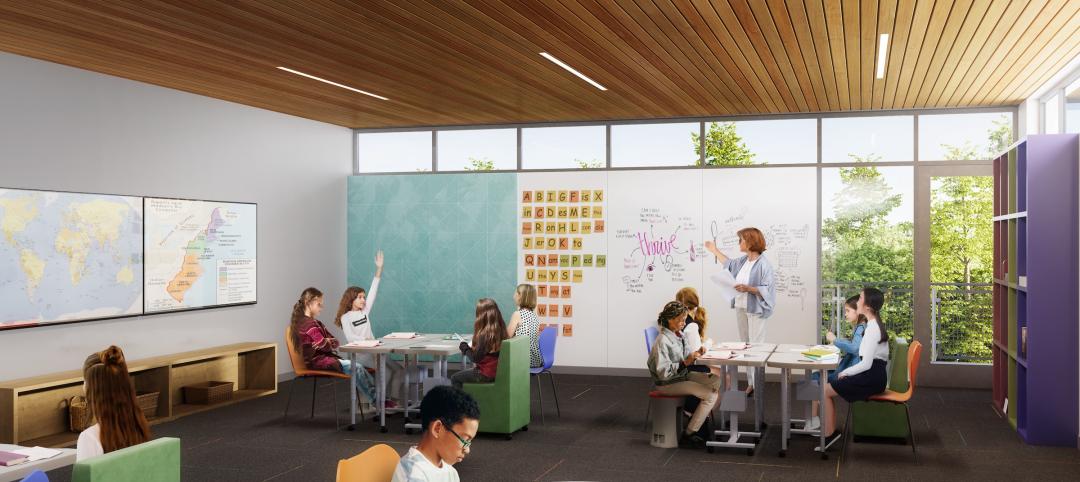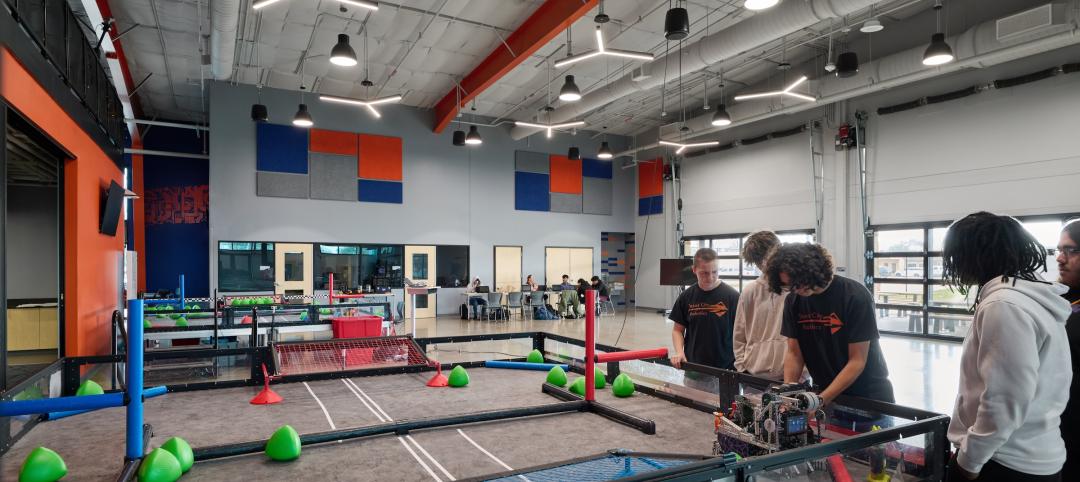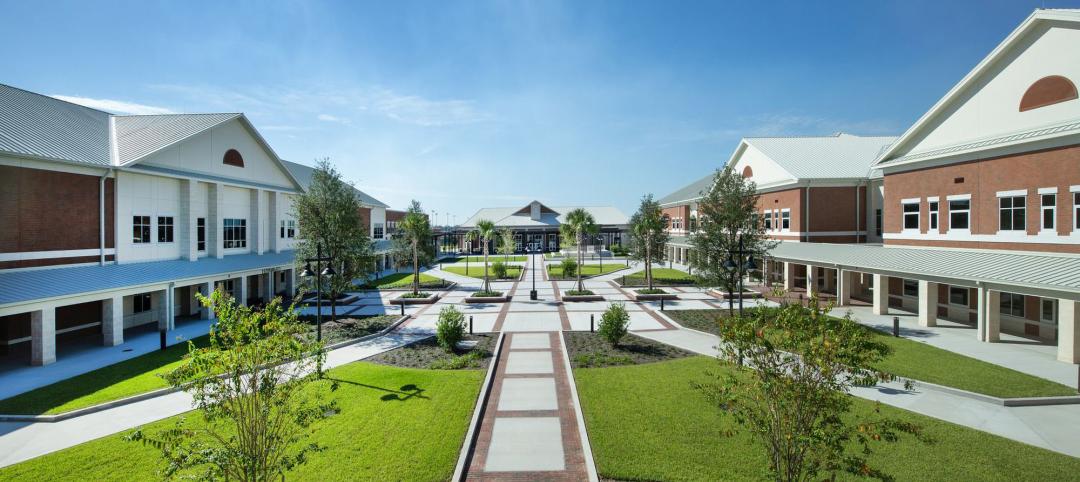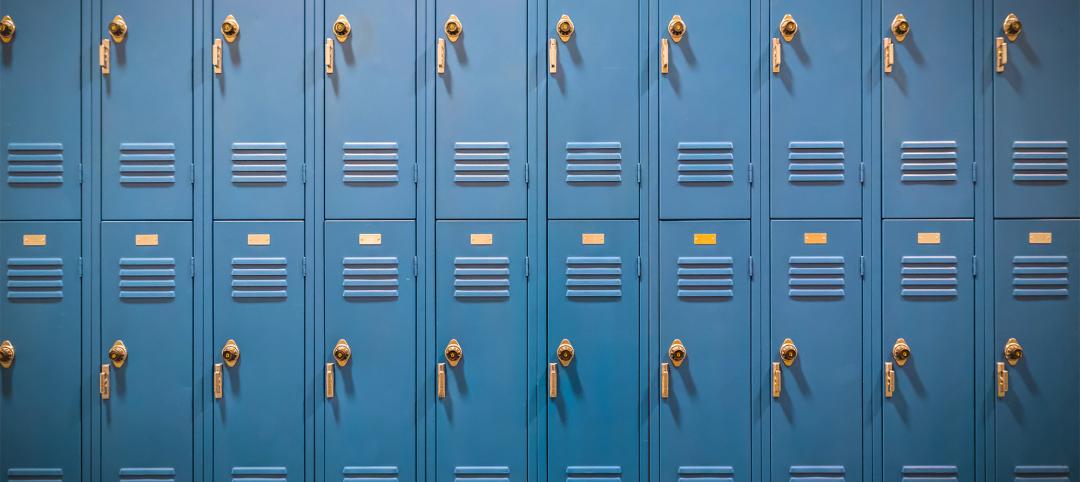Can you read the writing on the wall? At the new Kinkaid Learning Center, in Houston, that question can be taken figuratively and literally.
Thanks to dry-erase walls that line the learning center’s maker spaces, reading the writing on the wall becomes just another step in the creation process.
Designed by Kirksey Architecture’s PK-12 Education Team, the learning center’s maker spaces are meant to create a flexible learning environment that veers somewhat from traditional teaching methods.
Included in the new 26,000-sf building are crafting spaces, sewing spaces, a custom laser printer, a 3D printing space, and transportable “pop-up” maker spaces that can easily be moved from one classroom to another.
Dry-erase walls located between two classrooms have the ability to slide apart to create one large classroom for co-teaching. A literature teacher teaching Kurt Vonnegut’s Cat’s Cradle could combine with a history teacher teaching about the nuclear arms race.
 Courtesy Kirksey.
Courtesy Kirksey.
These maker spaces are meant to fight back against the “sage on the stage” concept of teaching. Kinkaid students can take an active, hands-on approach to their education.
This hands-on approach was integrated into the design process of the learning center, as well. Students and teachers took part in a visionary workshop, where they were asked to create an ideal environment for the new center and classrooms. Kirksey then integrated these suggestions into the final design.
The Nest is a workshop maker space equipped with the tools and materials necessary for building. New middle school classrooms use bright colors and floor-to-ceiling windows to allow for abundant natural light.
 Courtesy Kirksey.
Courtesy Kirksey.
The furniture in these classrooms is easily movable to encourage student interaction. The idea of flexible, movable furniture was carried throughout the entire learning center to allow students to study and collaborate as effectively as possible.
The Kinkaid Learning Center just completed its first academic year after opening in time for the 2016 school year.
Related Stories
K-12 Schools | Sep 30, 2024
The importance of selecting healthy materials for K-12 projects
Clark Nexsen interior designers Anna Claire Beethoven and Brittney Just, CID, IIDA, LEED Green Associate, share why it is imperative to specify healthy building materials in K-12 schools.
Education Facilities | Sep 16, 2024
Hot classrooms, playgrounds spur K-12 school districts to go beyond AC for cooling
With hotter weather occurring during the school year, school districts are turning to cooling strategies to complement air conditioning. Reflective playgrounds and roads, cool roofs and window films, shade structures and conversion of asphalt surfaces to a natural state are all being tried in various regions of the country.
K-12 Schools | Aug 29, 2024
Designing for dyslexia: How architecture can address neurodiversity in K-12 schools
Architects play a critical role in designing school environments that support students with learning differences, particularly dyslexia, by enhancing social and emotional competence and physical comfort. Effective design principles not only benefit students with dyslexia but also improve the learning experience for all students and faculty. This article explores how key design strategies at the campus, classroom, and individual levels can foster confidence, comfort, and resilience, thereby optimizing educational outcomes for students with dyslexia and other learning differences.
K-12 Schools | Aug 26, 2024
Windows in K-12 classrooms provide opportunities, not distractions
On a knee-jerk level, a window seems like a built-in distraction, guaranteed to promote wandering minds in any classroom or workspace. Yet, a steady stream of studies has found the opposite to be true.
K-12 Schools | Aug 8, 2024
New K-12 STEM center hosts robotics learning, competitions in Houston suburb
A new K-12 STEM Center in a Houston suburb is the venue for robotics learning and competitions along with education about other STEM subjects. An unused storage building was transformed into a lively space for students to immerse themselves in STEM subjects. Located in Texas City, the ISD Marathon STEM and Robotics Center is the first of its kind in the district.
Smart Buildings | Jul 25, 2024
A Swiss startup devises an intelligent photovoltaic façade that tracks and moves with the sun
Zurich Soft Robotics says Solskin can reduce building energy consumption by up to 80% while producing up to 40% more electricity than comparable façade systems.
K-12 Schools | Jul 15, 2024
A Cleveland suburb opens a $31.7 million new middle school and renovated high school
Accommodating 1,283 students in grades 6-12, the Warrensville, Ohio school complex features flexible learning environments and offers programs ranging from culinary arts and firefighting training to e-sports.
K-12 Schools | Jul 1, 2024
New guidelines for securing schools and community spaces released by the Door Security and Safety Foundation
The Door Security and Safety Foundation (DSSF), in collaboration with Door and Hardware Institute (DHI), recently released of “Are Your Door Openings Secure?.” The document provides guidelines to equip school administrators, building management personnel, and community leaders with a clear roadmap to create a secure and safe environment.
Senior Living Design | Jun 28, 2024
The country’s largest retirement community expands with educational facilities
The project will include a high school, a K-8 school, and an Early Learning Center aimed at serving the children of residents who work in qualified businesses within The Villages.
K-12 Schools | May 30, 2024
Inclusive design strategies to transform learning spaces
Students with disabilities and those experiencing mental health and behavioral conditions represent a group of the most vulnerable students at risk for failing to connect educationally and socially. Educators and school districts are struggling to accommodate all of these nuanced and, at times, overlapping conditions.

















